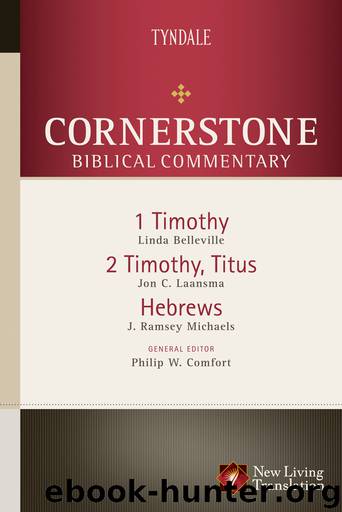1-2 Timothy, Titus, Hebrews by Linda Belleville & Jon Laansma & J. Ramsey Michaels

Author:Linda Belleville & Jon Laansma & J. Ramsey Michaels
Language: eng
Format: epub
Tags: RELIGION / Biblical Commentary / New Testament
Publisher: Tyndale House Publishers, Inc.
Published: 2009-01-27T16:00:00+00:00
With regard to this seventh point, that to which the potential elder holds fast is “the trustworthy message he was taught.” The phrase “trustworthy message” (ho pistos logos [TG4103/3056, ZG4412/3364]) is a general designation for the oral teaching that is trustworthy in that it is faithful to the apostolic teaching. For us that is the New Testament canon. The standard is “the teaching” (hē didachē [TG1322, ZG1439]), which is a designation for an authorized body of teaching as agreed upon and taught by the apostles (e.g., Acts 2:42; Rom 6:17; Heb 13:9). The role of teacher in this sense was filled by specially gifted and qualified people (Rom 12:7; 1 Cor 12:28-29; Eph 4:11; 2 Tim 2:2).
The point is not merely that this person likes to study and learn. To be sure the church needs thinkers, although even here they will be Christian thinkers and so their thinking—on any topic at all—will finally be in and for the church. But Paul was writing to Titus about elders. The interest is fully in the practical contribution the person could make on behalf of the church as a whole. Therefore, the point of seeking out someone properly devoted to the trustworthy message is that, on the one hand, “he will be able to encourage others with wholesome teaching” (1:9). On the other hand, he will be able to “show those who oppose it where they are wrong.” This allusion provides the segue from a list that is to some extent general and transferrable (though tailored to this situation) to the specific situation on Crete that made the quality of these appointments so pressing and important.
The verb translated “oppose” is antilegō [TG483, ZG515], which is used here for speaking against or contradicting someone. It belongs to a set of terms that Paul used to denote the opposition of some in the letters to Titus and Timothy (see 2 Tim 2:25). The phrase “show . . . where they are wrong” translates the verb elenchō [TG1651, ZG1794] (1:9; cf. 2 Tim 3:16; 4:2). This language probably includes official church discipline as a possible course of action (this verb is used in Matt 18:15; 1 Tim 5:20). Matthew 18, read within the Gospel of Matthew as a whole, is essential in that connection. Even leaving aside church discipline, the activity of reproving has never been pleasant and has become unfashionable in an ecumenical and postmodern age. Nevertheless, attention to what such activity means, when it is called for, and how it should be integrated into a complete approach to life and ministry is a perennial need if we are to remain faithful to apostolic faith and practice.
In plain English, the elder-overseer must be a theologian, deep and true. This is true for whatever the precise form the job profile takes in a given church or cultural setting. That person must be steeped in the Scriptures, must be schooled in the church’s teaching, and must possess the ability to teach the Good News in truth and correct error.
Download
This site does not store any files on its server. We only index and link to content provided by other sites. Please contact the content providers to delete copyright contents if any and email us, we'll remove relevant links or contents immediately.
| Guides | New Testament |
| Old Testament |
The Five People You Meet in Heaven by Mitch Albom(3561)
The Secret Power of Speaking God's Word by Joyce Meyer(3180)
Real Sex by Lauren F. Winner(3014)
Name Book, The: Over 10,000 Names--Their Meanings, Origins, and Spiritual Significance by Astoria Dorothy(2979)
The Holy Spirit by Billy Graham(2944)
0041152001443424520 .pdf by Unknown(2843)
How The Mind Works by Steven Pinker(2813)
ESV Study Bible by Crossway(2774)
Ancient Worlds by Michael Scott(2682)
Churchill by Paul Johnson(2578)
The Meaning of the Library by unknow(2565)
The ESV Study Bible by Crossway Bibles(2550)
The Gnostic Gospels by Pagels Elaine(2527)
MOSES THE EGYPTIAN by Jan Assmann(2412)
Jesus by Paul Johnson(2352)
City of Stairs by Robert Jackson Bennett(2347)
The Complete Dead Sea Scrolls in English (7th Edition) (Penguin Classics) by Geza Vermes(2277)
The Nativity by Geza Vermes(2226)
Ancient Near Eastern Thought and the Old Testament by John H. Walton(2223)
